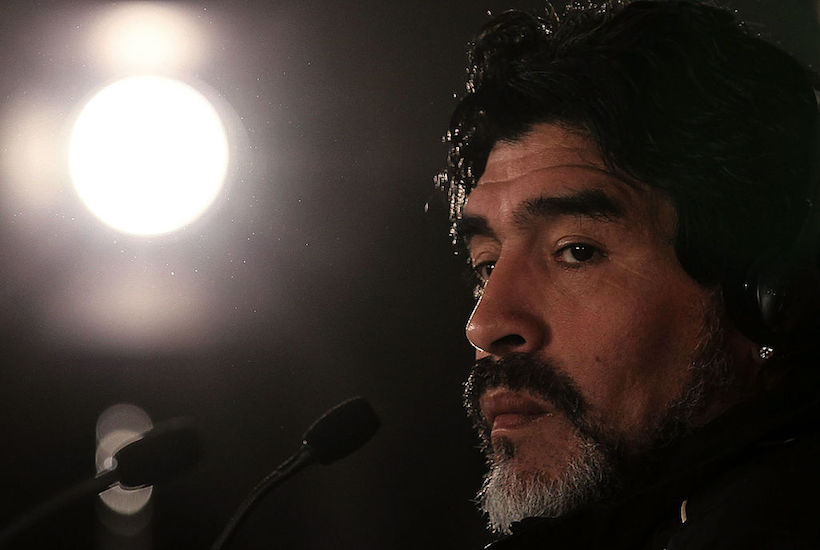Last week, I received a blunt text message. “Maradona. Should be a lesson to every child.”
In other words, a complete waste of a life.
And a reminder here in Australia we need to remind, remind, remind our youth and hero our past sporting heroes who have NOT let themselves descend into a decayed decadence as the decades pass.
The person who sent me that text had no idea that an hour before I had given a potted version of Diego Maradona to my three primary school-aged kids, complete with the on-field highs and lows as well as the off-field woes and drug scandals that cut short the life of one of the greatest footballers of all time.
History exists to not only remind us of what has happened but to give others the chance to not repeat the same mistakes.
Hearing the news of his death, jolted me back to my childhood in England watching the 1986 World Cup.
Along with thousands of other English people, I didn’t see any “Hand of God” coming down from the sky. What we all saw was simply cheating at the highest level. My Dad added his few cents worth culminating in “cheating in anything never ends well.”
Living in Britain at that time, football was synonymous with hooligans and taking family to a football match really wasn’t the done thing. No one ever knew when a barrage of plastic seats would rain down upon innocent crowd members. The hooliganism was so bad in the 1980s that it was simply safer to stay home and watch on TV. But until that fateful day in 1986 nobody had seen such blatant cheating. The sheer breathtaking brilliance displayed by the same man moments later remains overshadowed forever by the illegitimate act that preceded it.
It was sad to tell my 12-year old son that getting away with behaviour that others can’t get away with led to Maradona’s spiral into the decadence and constant excuse-making that eventually led to him simply wasting his life away – but that is the sad truth.
Maradona had been enabled. He seemed to believe that he could get away with anything and there never seemed to be genuine consequences for appallingly bad and sometimes illegal behaviour either on or off the field.
That’s before we even knew what “enabling someone” was really all about.
“He was only 60, that’s not that old,” my 11-year old daughter chimed in.
Argentina is a tough country.
The capital city, Buenos Aires, is even tougher.
The street-smarts needed just to survive there are beyond what many Australians could ever imagine.
The context to that “Hand of God” match should also not be forgotten when assessing the impact on those watching on both sides of the contest.
In 1982, the Falklands War broke out between Argentina and the United Kingdom over two British dependent territories. Britain won.
The war lasted around 10 weeks. Only four years later Diego Maradona was the captain of Argentina – the team literally and the nation figuratively – that took on England in a match that would propel the winner to touching distance of being the champions of the worlds. Passions on both sides were obviously at fever pitch.
That Argentina won the match is etched in the history books. Sadly, so is the method of victory — and it is not an edifying story.
Commentators who trot out the predictable sayings such as “Maradona should be remembered for his genius sporting ability not his flaws” are not acknowledging that in the case of Maradona you simply cannot separate the man from the sport.
In the same way, Australia is just as guilty of putting our flawed sporting heroes up on pedestals and not calling out the elephant in the room.
Brownlow Medallist and former champion West Coast Eagles and Richmond footballer Ben Cousins is now 42 years old.
He made his documentary film, “Such is Life; The Troubled Times of Ben Cousins” saying he hoped it would serve as a cautionary tale against drug use.
It remains one of the most-watched documentaries in Australian history.
However, all that is forgotten.
He continues to struggle with drug addiction.
He has been in and out of prison several times for both drug and family-related issues.
Media are guilty of forgetting all too often that Ben Cousins is not an AFL poster boy in the way he was back in the 1990s.
He is a man and a father of two children.
When sections of the Australian media embark on a sycophantic defence of a halcyon era it does no favours to anyone.
Each crop of young AFL footballers should be made to watch the documentary.
They may not think what has happened to Cousins will happen to them.
No one ever does.
There are fallen sporting stars across every sport with what could have been. Golfer John Daly grabbed world attention with his two major championship wins but has featured in thousands more headlines for his off-field struggles. In Australia, we can’t escape the continual rollercoaster of National Rugby League players behaving badly both during and after their sporting careers are over.
Society wants the excuses to stop for the bad behaviour, but our society lost the ability to call a spade a spade a long time ago.
That spade is each one of those sports stars to take responsibility for the choices they make which is part of becoming an adult.
Excusing away our sporting stars’ bad behaviour is almost a national sport.
Excusing is simply enabling the same pattern of behaviour to continue throughout their lives when the bright lights of the stadiums and training grounds have been turned off.
The three days of National mourning in Argentina has now ended.
The fight to remind every child NOT to go down Diego Maradona’s path begins.
Got something to add? Join the discussion and comment below.
Get 10 issues for just $10
Subscribe to The Spectator Australia today for the next 10 magazine issues, plus full online access, for just $10.


























Comments
Don't miss out
Join the conversation with other Spectator Australia readers. Subscribe to leave a comment.
SUBSCRIBEAlready a subscriber? Log in